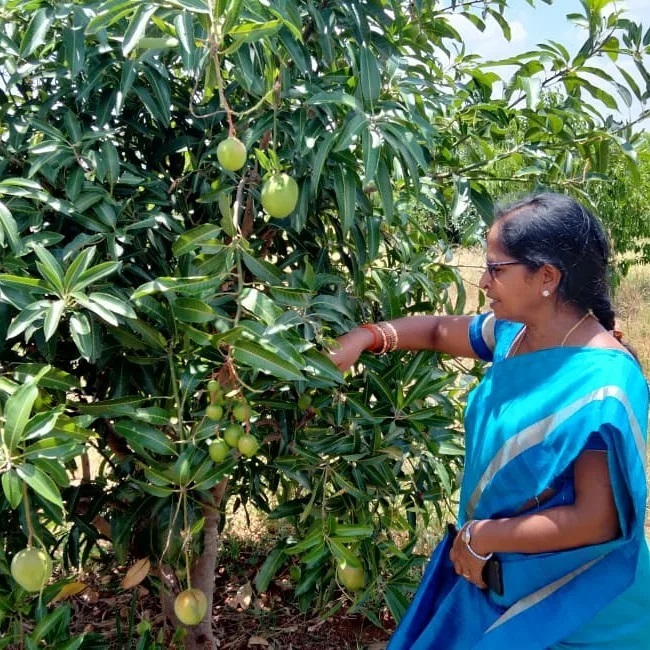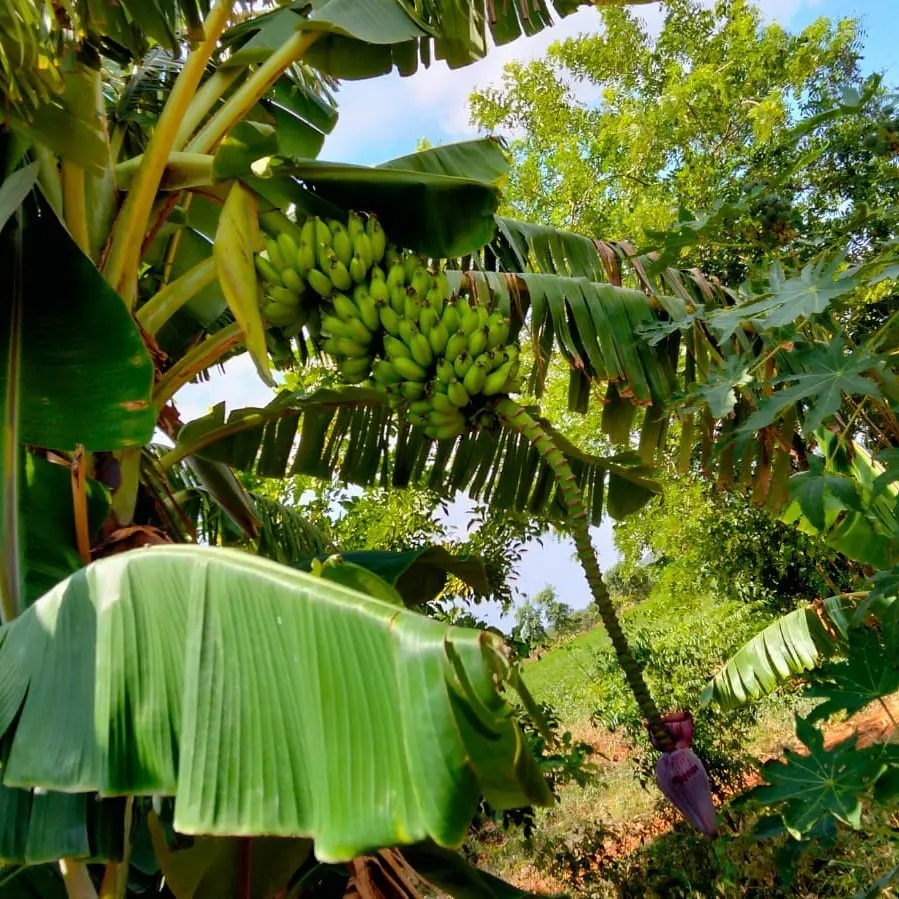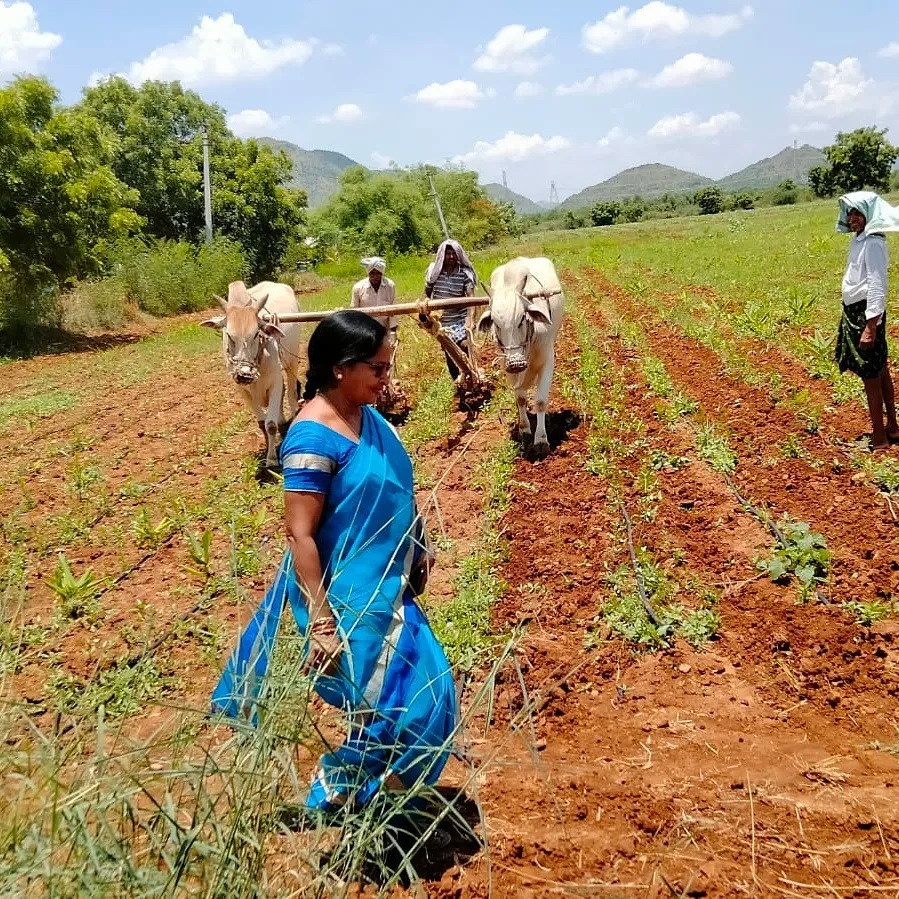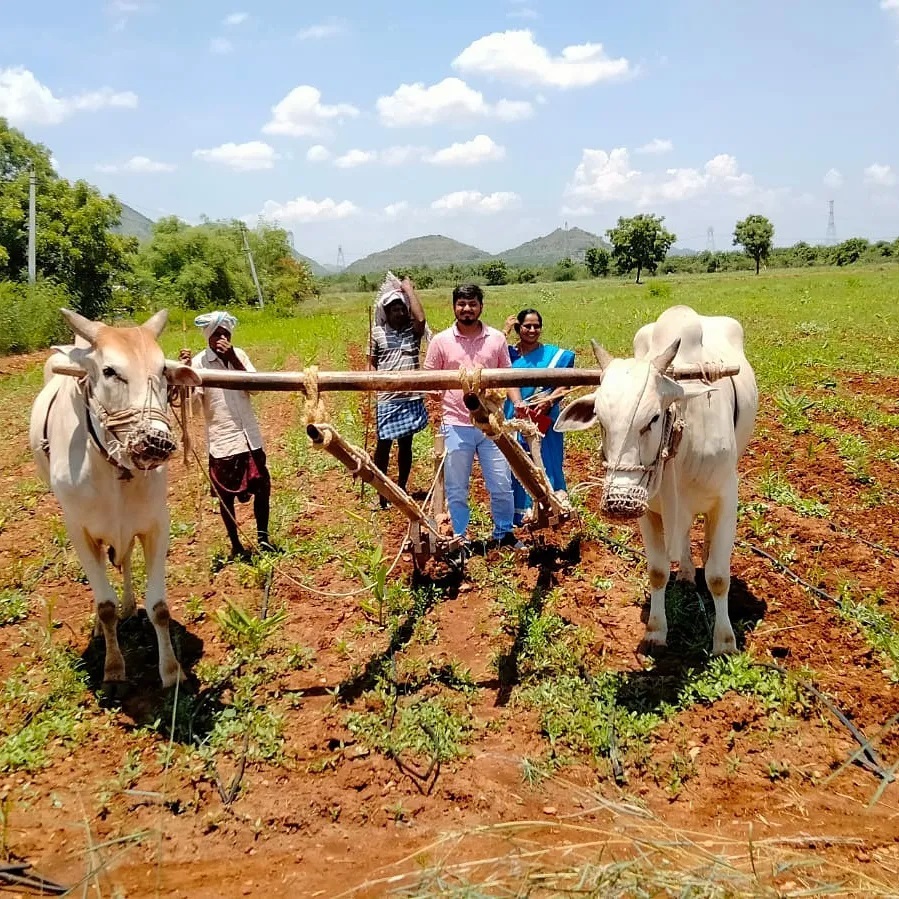The Power of Precision Agriculture: Revolutionizing Organic Farming with Satellite Technology

In the ever-evolving world of agriculture, we at Farmonaut are proud to be at the forefront of a revolution that combines cutting-edge technology with sustainable farming practices. Today, we’re excited to share a success story that exemplifies the incredible potential of precision agriculture tools in organic farming.
Viswamatha Farms: A Testament to Organic Success
On August 23, 2021, Viswamatha Farms completed its annual organic certification audit, once again receiving recognition as a 100% organic farm. This achievement is not just a testament to their commitment to natural farming practices but also highlights the significant role that precision agriculture (PA) tools play in modern organic farming.
The success of Viswamatha Farms demonstrates how the integration of natural farming techniques with advanced PA tools can lead to remarkable results. By leveraging satellite data provided by Farmonaut, they’ve been able to achieve a good harvest while maintaining their organic status.
The Synergy of Remote Sensing and Natural Farming
At Farmonaut, we firmly believe that the combination of remote sensing technology and natural farming practices has the potential to revolutionize the agriculture sector. Our satellite-based solutions offer farmers a wealth of information that can significantly improve their decision-making processes and overall farm management.

Benefits of Satellite Data in Organic Farming
By utilizing our satellite data, organic farmers can reap numerous benefits:
- Reduce Chemical/Fertilizer Consumption: Our system allows farmers to identify specific areas where crop health is suboptimal, enabling targeted application of organic fertilizers and treatments only where needed.
- Lower Labor Costs: By pinpointing areas that require attention, farmers can direct their workforce more efficiently, focusing on critical zones within their fields.
- Optimize Irrigation: Our technology helps identify areas with low plant water stress, allowing for precise irrigation and reducing water wastage.
- Increase Overall Yield: With better resource management and targeted interventions, farmers can significantly boost their crop yields.
- Maintain Soil Health: Our Soil Organic Carbon (SOC) model helps identify areas with low organic carbon content, enabling farmers to take corrective measures and maintain optimal nutrient composition.
The Role of NDVI in Agriculture
One of the key metrics we use at Farmonaut is the Normalized Difference Vegetation Index (NDVI). But
what is NDVI in agriculture? NDVI is a crucial indicator of plant health and vigor, derived from satellite imagery. It measures the difference between the red and near-infrared light reflected by vegetation.
- Healthy vegetation absorbs most of the visible light and reflects a large portion of near-infrared light.
- Unhealthy or sparse vegetation reflects more visible light and less near-infrared light.
By analyzing NDVI data, we can provide farmers with valuable insights into crop health, allowing them to make informed decisions about irrigation, fertilization, and pest management.

Precision Agriculture Tools: A Game-Changer for Organic Farming
The success of Viswamatha Farms underscores the importance of
precision agriculture tools in modern organic farming. These tools, which include our satellite-based monitoring system, enable farmers to:
- Monitor crop health in real-time
- Identify potential issues before they become serious problems
- Optimize resource use, including water and organic fertilizers
- Make data-driven decisions to improve overall farm productivity
By leveraging these tools, organic farmers can overcome many of the challenges traditionally associated with natural farming methods, achieving higher yields and better crop quality without compromising their principles.
Reducing Chemical Fertilizer Consumption
One of the most significant advantages of our system is its ability to help farmers
reduce chemical fertilizer consumption. While organic farms don’t use synthetic fertilizers, this principle is equally applicable to organic amendments and treatments. By providing precise data on crop health and soil conditions, our technology allows farmers to:
- Apply organic fertilizers and treatments only where needed
- Avoid over-application, which can lead to nutrient runoff and environmental issues
- Optimize the use of costly organic inputs, improving farm economics
This targeted approach not only helps maintain the organic status of the farm but also contributes to overall sustainability by minimizing resource use and environmental impact.
Increasing Overall Yield in Organic Farming
A common misconception about organic farming is that it necessarily leads to lower yields compared to conventional methods. However, with the right tools and practices, it’s possible to significantly
increase overall yield while maintaining organic certification. Our satellite-based system contributes to yield improvements by:
- Enabling early detection of crop stress, allowing for timely interventions
- Optimizing resource allocation, ensuring that each plant receives the care it needs
- Providing data-driven insights for crop rotation and intercropping strategies
- Helping farmers understand and adapt to microclimates within their fields
By combining these technological advantages with sound organic farming practices, farmers like those at Viswamatha Farms can achieve yields that rival or even surpass those of conventional farms.
The Importance of Organic Carbon Content in Indian Soil
As we delve deeper into the science of sustainable agriculture, it’s crucial to understand the significance of
organic carbon content in Indian soil. Soil organic carbon (SOC) is a key indicator of soil health and fertility, playing a vital role in:
- Improving soil structure and water retention capacity
- Enhancing nutrient availability to plants
- Supporting beneficial soil microorganisms
- Increasing the soil’s resilience to erosion and environmental stresses
In India, where intensive agriculture has led to soil degradation in many regions, maintaining and increasing SOC levels is crucial for long-term agricultural sustainability. Our SOC model helps farmers identify areas where organic carbon levels are low, allowing them to take targeted action to improve soil health.

Farmonaut: Leading the Precision Agriculture Revolution
At Farmonaut, we’re committed to making precision agriculture accessible and affordable for farmers worldwide. Our platform integrates satellite imagery, artificial intelligence, and machine learning to provide farmers with actionable insights that can transform their operations.
Key Features of Our Platform:
- Real-time crop health monitoring using multispectral satellite imagery
- AI-driven personalized farm advisory through our Jeevn AI system
- Blockchain-based product traceability for enhanced supply chain transparency
- Fleet and resource management tools for optimized operations
- Carbon footprinting capabilities to support sustainable farming practices
Our solutions are designed to cater to a wide range of users, from individual smallholder farmers to large agribusinesses and government institutions. By democratizing access to advanced agricultural technologies, we’re helping to create a more sustainable and productive future for farming.
Farmonaut vs. Drone and IoT-Based Farm Monitoring
While there are various technologies available for farm monitoring, our satellite-based system offers several advantages over drone and IoT-based solutions:
| Feature |
Farmonaut Satellite System |
Drone-Based Monitoring |
IoT-Based Monitoring |
| Coverage Area |
Large scale (entire farms/regions) |
Limited by flight time and regulations |
Limited by sensor placement |
| Frequency of Updates |
Regular (as frequent as daily) |
Dependent on manual flights |
Real-time, but localized |
| Initial Setup Cost |
Low (subscription-based) |
High (equipment purchase) |
Medium to High (sensors and network) |
| Maintenance |
Minimal (handled by Farmonaut) |
Regular (equipment upkeep) |
Ongoing (sensor replacement, calibration) |
| Data Processing |
Automated with AI/ML |
Often requires manual processing |
Automated, but may lack advanced analytics |
| Scalability |
Highly scalable |
Limited by operational capacity |
Scalable, but with increasing complexity |
Join the Farmonaut Community
We invite you to experience the power of precision agriculture for yourself. Our platform is accessible through various channels:
For developers and businesses interested in integrating our technology into their own systems, we offer robust API solutions. Learn more about our
Satellite and Weather API.
Frequently Asked Questions (FAQ)
Q: How does Farmonaut’s satellite monitoring work?
A: We use multispectral satellite imagery to analyze various aspects of crop health, including vegetation indices like NDVI. This data is processed using advanced algorithms to provide actionable insights to farmers.
Q: Is Farmonaut suitable for small-scale farmers?
A: Absolutely! Our platform is designed to be accessible and affordable for farmers of all scales, from smallholders to large agribusinesses.
Q: How often is the satellite data updated?
A: The frequency of updates depends on the subscription plan, but we can provide data as often as daily for some regions.
Q: Can Farmonaut help with organic certification?
A: While we don’t directly provide certification, our data can help farmers maintain organic practices by optimizing resource use and providing evidence of sustainable farming methods.
Q: How accurate is the soil organic carbon (SOC) model?
A: Our SOC model has been validated against ground-truth data and provides a reliable estimate of organic carbon levels. However, for the most accurate results, we always recommend complementing our data with periodic soil testing.
Q: Can Farmonaut integrate with other farm management systems?
A: Yes, we offer API access that allows for integration with various farm management software and IoT systems.
Conclusion
The success of Viswamatha Farms in maintaining their organic certification while achieving good harvests is a powerful testament to the potential of precision agriculture in sustainable farming. At Farmonaut, we’re proud to be part of this agricultural revolution, providing farmers with the tools they need to optimize their operations, reduce resource consumption, and increase yields – all while maintaining the highest standards of organic and sustainable farming.
As we look to the future, we’re excited about the continued integration of advanced technologies in agriculture. From satellite monitoring to AI-driven advisory systems, these tools are not just improving farm productivity; they’re paving the way for a more sustainable and food-secure world.
We invite you to join us on this journey. Whether you’re a small-scale organic farmer, a large agribusiness, or somewhere in between, Farmonaut has the solutions to help you take your farming practices to the next level. Together, we can cultivate a future where technology and nature work in harmony to feed the world sustainably.
For more information or to get started with Farmonaut, please don’t hesitate to contact us at
[email protected] or call us at +91-6366026267. Let’s grow together towards a greener, more productive future in agriculture!
 In the ever-evolving world of agriculture, we at Farmonaut are proud to be at the forefront of a revolution that combines cutting-edge technology with sustainable farming practices. Today, we’re excited to share a success story that exemplifies the incredible potential of precision agriculture tools in organic farming.
In the ever-evolving world of agriculture, we at Farmonaut are proud to be at the forefront of a revolution that combines cutting-edge technology with sustainable farming practices. Today, we’re excited to share a success story that exemplifies the incredible potential of precision agriculture tools in organic farming.


